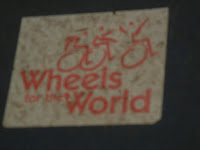There is so much that happened here today. I will keep it nice and short though. We arrived at the Morning Star School and were greeted by the daughter of the founder and welcomed with hugs and smiles! They even had a "Akwaaba! NYU" sign outside of the school:
The children were so pleasant, attentive, and obedient. This is a private school and the parent's of the children pay a fee to enter the school. We visited multiple classrooms where we were greeted the same way, "Hello visitors, how are you?" Just ADORABLE. Their motto is the cutest thing ever, "Morning Star" the head mistress states, "RISE AND SHINE!" the children answer back:
The classrooms range from kindergarden to 8th grade. We visited an array of classrooms, from computers to cooking classes to mathematics and science classes. We talked to many of the students in each classroom to ask them how much they liked the subject they were learning, I don't think anyone answered "no." I can tell they are much better students than I am! We watched them during their PE class in which they have set on an open area next to the most beautiful tree that I seen in Ghana:



We learned just how much energy the woman who built this school put into its foundation. I mean this entire school, started in her living room! Amazing! We were served snacks and soda, and treated with so much hospitality, it was so unexpected! We did ask about how children with disabilities are educated in this school. There is a little girl with some type of disability (was unclear to me) who has a special seat in one of the classrooms and we were told she is a VERY BRIGHT girl, we were happy to hear she was being accommodated. As for other children with disabilities, such as learning disabilities, they are referred for special tutoring, and extra help, I believe outside of the school, which is also a good thing. We didn't want to leave! They even performed for us, and this we enjoyed sooo much, we even danced along side them! Beautiful!
And before we knew it, we were running late to our next visit, The New Horizon Special School:
This school is dedicated to young adults who have special needs. Most of the students there have Down's Syndrome. I was surprised at how social these adults are and I almost feel as though the United States is behind in this aspect. I feel that many of our schools are so worried about handwriting, computers, reading (these are essential components) but I think they forget that these children also have social needs. We walked into the school for a brief tour before heading out to their gazebo for a dance performance. The students performed some of the traditional Ghanaian dances that we had learned a couple of nights ago from Kingsley, Rosemary, and the other CRAs at NYU. They performed them so well with so much effort and we having fun at the same time. It was really a breath of fresh air. They were laughing and really getting into their roles. It was exciting to see them so excited.
As we were leaving we approached their shop where they have items for sale such as jewelry, and the profit is given to fund the school's resources. I bought two sets of a necklace and earrings. Shopping always puts the icing on the cake for me. I also took a picture with one of the employees who works at the school with the students, and it just goes to show how welcoming Ghanaian people truly are, as she wrapped her arms around my waist and waited for the picture to be taken:
The photos pictured on the right side of my blog were taken at this school, and they were so beautifully presented to us, that they are some of my most cherished pictures from the trip.
















































